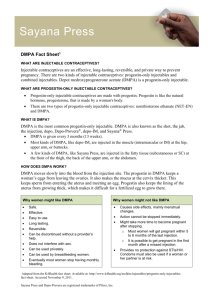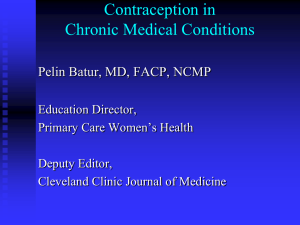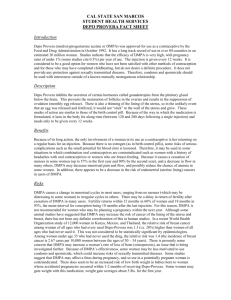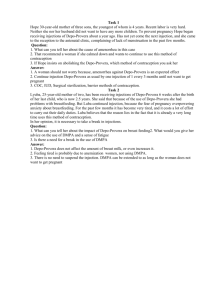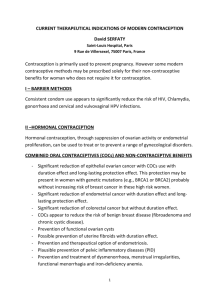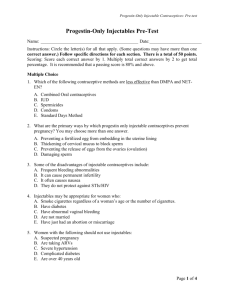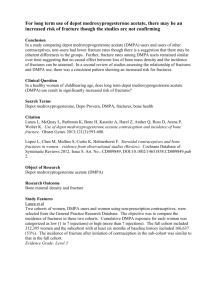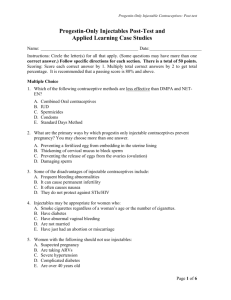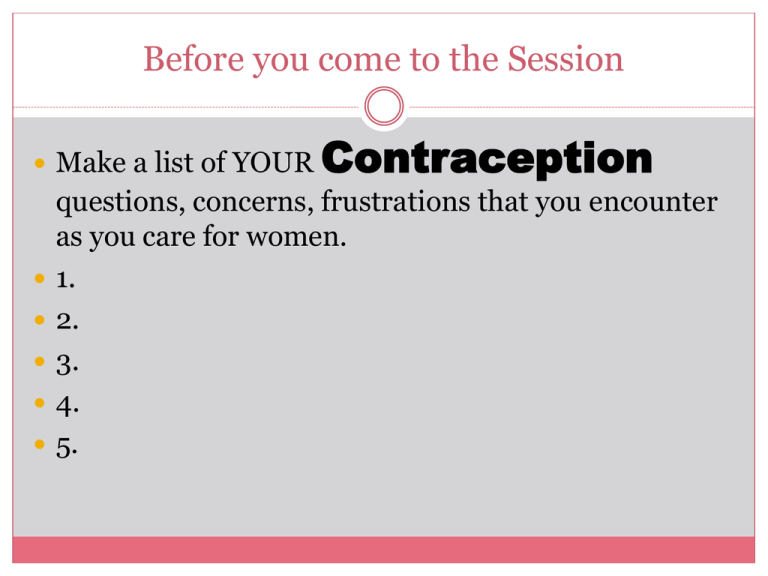
Before you come to the Session
Make a list of YOUR
Contraception
questions, concerns, frustrations that you encounter
as you care for women.
1.
2.
3.
4.
5.
MANAGING CONTRACEPTIVE
COMPLICATIONS 2010
DAWN DURAIN, CNM, MPH, FACNM
ASSOCIATE DIRECTOR
UPENN NURSE-MIDWIFERY PROGRAM
duraind@NURSING.UPENN.EDU
Your list…
Needs
Issues
Requests
her list
“I’ve tried them all…nothing works for me, what
should I do?”
“..the pill made me bleed, the shot made me gain
weight, the patch irritated my skin, the ring fell out,
the condom broke, I’m afraid of an IUD….I just had
an abortion last month and don’t want another
one……”
“Don’t take my method away!!”
our path today
Contraceptive overview
Complications
Side effects
Misuse, misunderstandings
Ours and Hers
Underuse aka unintended pregnancy
What’s coming down the road
risk
Perceived
Real
Myth
Communicated
How do you portray risk
How do you interpret/re-interpret the current evidence
Experienced
Side effect vs. complication
method review
Do it yourself
Barrier
Hormonal
Other
diy
Abstinence
Counting the days/periodic abstinence
Withdrawal – Don’t underestimate it!
Breastfeeding
“I can’t get pregnant if I ……”
barrier
Male condom
Female condom
Sponge – it’s back!!
Caps – gone, but will return?
Diaphragm – out of fashion?
Spermicides
Microbicides – hopefully!
hormonal
Pills
COC
POP
Patch
Ring
Injectables
IUC
IUD, IUS
Implants
pills
Combined Oral Contraceptives
Withdrawal Bleeding/Hormone free Interval Trends
Shortened
Absent
Is this safe?
Is this acceptable?
Is this beneficial?
evra
Extended/continuous use
I heard this is dangerous, will it kill me?
I can’t put it on my breasts because it causes breast
cancer, right? Wrong!
nuva ring
You want me to do what? Where?
Extended/continuous use
I love the Nuva Ring, but….I have this problem…
DMPA
It won’t make me gain weight will it?
Last time I bled the whole time…
Sub Q/self administered
new and old barriers
Stand alone
Today sponge
Lea’s shield
Fem cap
Diaphragm
SILCS – one size flexible, silicone
Impregnated with ….
female condom
Current use
FC2 = second generation -- Less ‘noise’
implanon
Single rod system, 3 year efficacy
No reported pregnancies
Are you being trained?
Who is the perfect candidate?
What are the insertion criteria?
intrauterine contraception
Why such low use of IUC in the US?
2% in US compared to14% China & Africa, 28% E Europe
Paraguard – ____ string color, good for ___ years
Mirena – _____ string color, good for ___ years
New shapes
Conform to fundal shape
New features
‘frameless’
LNG
post coital
Hormonal/Plan B
Paraguard IUD
Pre and/or post coital
In trials- Carraguard gel with LNG – (- efficacy as
microbicide…but….)
..and now a word about us!
Provider beliefs & behaviors
About our clients
About the methods
‘this is how we have always done it’
Use of the ‘evidence’
Presentation of the evidence
Influence of policy
Institutional limitations
Use of the Evidence
WHO Medical Eligibility Criteria
UK Medical Eligibility Criteria
CDC Medical Eligibility Criteria
The Medical Eligibility Criteria for the United States
were developed at the CDC in March, 2009. They will
be disseminated widely through a CDC website, books
such as Managing Contraception and Contraceptive
Technology, and organizations such as Planned
Parenthood, The California Family Health Council
and Family Health International in Feb/March 2010
http://www.cdc.gov/reproductivehealth/UnintendedPregnanc
y/USMEC.htm
preferences of the users
Ideal method
The one that works for her
Most popular method
In US ___________
Worldwide______________
Trends in use
IUC
complications
Medical Complications
Side effects
Misuse, Misunderstandings
Underuse
Medical Complications
Vascular
Stroke
Hypertension
VTE
Diabetes
Bone Mineral Density changes/loss
side effects
Bleeding….and..Not bleeding
Headaches
Decreased libido
Decreased vaginal secretions
Monilia
Weight gain
I just ‘feel’ different
btb
CHC
POP
DMPA
IUC
Norplant, Implanon
amenorrhea
Desired
Continuous use CHC
DMPA
Mirena
Norplant, Implanon
Undesired
COC
Bone mineral density loss – the special case of
DMPA
Should we worry
How should we counsel
Surveillance
Term limits
Calcium intake
Other risks for bone loss/osteopenia/osteoporosis
Kaunitz , Arias, McClung (2008) Bone Mineral Density Recovery After DMPA Injectable
Contraception Use Contraception 77 67-76.
headaches
CHC
New headache
MD diagnosed Migraine
Use of headache descriptor questionnaire
Use of headache diary
DMPA
VTEs
“The general population risk is low—about 1 per
10,000 woman-years—and thus the incidence with
COCs of 3.0 to 4.0 per 10,000 woman years is still
low.
The risk is clearly lower than the incidence of 5.7 per
10,000 woman years estimated for pregnancy.”
Mishell (2000) Oral contraceptives and cardiovascular events: Summary and application of data.
International Journal of Fertility 45:121
VTEs and Evra
Studies disagree on existence of increased risk for
VTEs ONLY – no increased risk for stroke or MI
The best studies we have:
One = no increased risk between COC and Evra
One = twofold increaseed risk for Evra users compared to COC
users
The FDA requested more research and data.
?Increased risk for women at risk?
Who are these ‘women at risk’
1.
2.
3.
4.
5.
6.
7.
8.
9.
10.
Migraines WITH Aura
Women taking COS who have migraine headaches
with aura have 2 – 4 times risk of strokes!
May be dose related
Your Neurology colleagues may disagree with you!
Let them write the prescription!
Allais De Lorenzo Mana Benedetto (2004) Oral contraceptives in women with migraine: balancing
risks and benefits Neurological Sciences 25:3 s211-214
Curtis Chrisman Peterson (2002) Contraception for women in selected circumstances. Obstetrics &
Gynecology 99:1100
decreased libido
Long term COC use
‘real’ change
Relationship change
?impact of age/perimenopause
vaginal changes
Increased secretions
Decreased secretions
Increased incidence monilia
‘it just feels different’
hypertension
Per the evidence NOT an expected side effect of CHC
use
Women well controlled on anti-hypertensives may
use CHC – unless they are smokers!
Curtis Chrisman Peterson (2002) Contraception for women in selected circumstances. Obstetrics &
Gynecology 99:1100
weight gain
Per the evidence NOT a side effect of hormonal
contraceptive use…..so why do they tell us about
weight gain patterns?
Gallo Grimes Schulz et al (2004) Combination estrogen-progestin contraceptives and body weight:
Systematic review of randomized controlled trials. Obstetrics & Gynecology 103:359
Gallo Lopez Grimes et al: (2006) Combination contraceptives: effects on weight. Cochrane Database
Systematic Review 25:CD003987
‘I don’t feel like myself’
Impact of fears - ?r/t fertility, medical harm
Impact of change in intimate relationships
Impact of actual chemical changes
Screen for depression, abuse, trauma, etc.
misuse, misunderstanding
Fears
Missing dose/incorrect interval
When does it matter
When would EC be appropriate
When to throw in the towel
fears
It will kill me
It won’t work
It will make me infertile
It will make me fat
My cousin didn’t like it
My mother got headaches
..the bleeding issue
My parents/bf/bff will find out
the schedule
I didn’t start
When do I start
I forgot to
Take it
Put it on
Put in in
Come for my shot
I only use it when I have sex right?
quickstart
Who needs an exam?
Quickstart with ec
Quickstart without ec
How to be reasonably sure she is not pregnant
Informed decision making
When is ‘quickstart’ not a good idea
mixing and matching
Meds
Conditions
Post abortion
meds
The truth about COCs and antibiotics
Anti seizure meds
Anti hypertensives
OTCs
Antiretrovirals
meds
Don’t forget about OTCs
The Magic List – Good evidence that these DO decrease the
absorption &/or efficacy of COCs:
Rifampin
Grisefulvin
COCs may change the absorption Tylenol, Morphine
Corticosteroids
Aminophylline, Theophylline
+ or – of these meds:
Could go either way : Anti seizure meds
co-existing conditions
Diabetes
Combined methods:
?vigilence in first cycles re: glucose control, report changes
HIV +/AIDS
Check interaction with Antiretrovirals as they VARY
IUC ok
Co-existing conditions cont’d
Seizure Disorder/Epilepsy
CHM – little info re: Nuva Ring and Evra
Check interactions with specific med
DMPA best choice as may positively impact seizure threshhold
Asthma
CHM – no known adverse effect
May positively impact asthma attacks
co-existing cont’d
BMI
Obesity
CHM - Decreased efficacy? (evidence uncertain)
Evra - ?documented decreased efficacy > 198 lbs.
Does this mean it is contraindicated? NO!
Low BMI
CHM – bone density protection?
DMPA – careful injection site choice
initiation of contraceptives post abortion
The PERFECT Quickstart moment!
CHC
DMPA
Prolonged bleeding?
Implant - Implanon
IUC
?need to do GC/Chlamydia?
Risk of expulsion?
EC for PRN use at the least!
underuse – unintended pregnancy
Why can’t we reduce the unintended pregnancy rate
in the US?
???% of women discontinue use of their method
within the first year of use
What personal characteristics place women at risk
for contraceptive failure?
So, how do YOU communicate risk?
10% vs ‘1 in 10’ vs ‘low risk of ….’
Risk of pregnancy vs Risk of method use
Address myth
Making risk communication more effective
Paling, J. BMJ 2003;327:745-748
Copyright ©2003 BMJ Publishing Group Ltd.
The Seven Simple Strategies for Helping Patients Understand
Risks * J Paling
1. Prepare by first learning about the actual difficulties
that patients experience in attempting to understand
risks.
2. Accept the challenge that patients' emotions will
invariably filter the facts and cannot be ignored.
3. Revise the way you explain probabilities to patients.
The most commonly used methods can be greatly
improved with small changes.
4. Try to avoid speaking to patients in terms of relative
risks. Ensure you provide context so patients get
“information” and not just “data.”
5. Never just give the negative perspective but, instead,
make sure the positive perspective is always provided as
well.
6. Explain the risk numbers by using visual aids. These
give context as well as achieving understanding for the
largest number of patients.
7. Realize that sharing visual aids with patients can serve
to reinforce the health care provider–patient bond,
enhance trust, and encourage acceptance of the health
care provider's message.
so what do we do with…
Nothing has worked in the past
I can’t do that
I’m afraid
I don’t believe you
‘Out the door’ Instructions
When should I come back?
Why should I come back?
Address ‘change of heart’ after she leaves your office
PRN EC use ‘just in case’….
Need for pregnancy test if Quickstarted?
Opportunity to check in with her.
What’s coming on down the road?
More COCs with shorter /no Hormone Free Interval
Continuous use research - Evra, Ring
More IUC choices
New Barriers
Microbicides?!
resources
Online
ARHP
Medscape
Dr.James Trussell
Journals
Contraception
Thank you!
MAY THE CONTRACEPTING FORCE BE WITH
YOU!

